Glasgow Restaurants: Persia, special feature by Roy Beers
It was a great restaurant but closed July, 2013
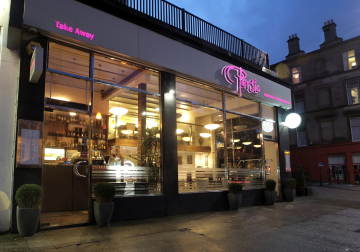 Persia – and a thousand and one delights in Glasgow West End
Persia – and a thousand and one delights in Glasgow West End
Persia, 665 Great Western Road, Glasgow G12 8RE
email.
Telephone: 0141 237 4471
Infinitely varied, wonderfully “different” – Persian cuisine is nothing less than one of the world’s greatest culinary achievements, steeped in the rich heritage of literally thousands of years of illustrious tradition.
But it’s only since the launch of critically-lauded “Persia” in the West End that we’ve come anywhere close to seeing at first hand just how much this incredible cultural experience has to offer.
A good place to start with what many people will inevitably still see as a "new" concept in Scotland is the name itself. "Persia" might be thought to connote specifically to the area covered by modern-day Iran, but the very name hints at a broader and more exciting reality - because in fact we're talking about all of the regions which once made up the magnificent Persian Empire, which at its height constituted much of the Near East.
Dine at Persia, and you will certainly gain a glimmer of understanding about the beauty, zest for life and sheer artistry which make up this amazing and majestic tradition.
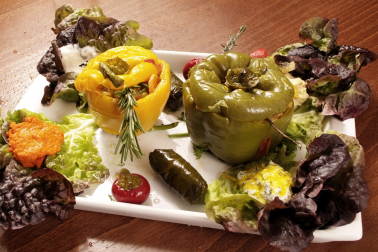 Exactly how this translates into an exquisite dining experience can be gleaned from some of the photographs in this feature.
Exactly how this translates into an exquisite dining experience can be gleaned from some of the photographs in this feature.
They reveal at a glance the fact that preparation and presentation is everything in the best of Persian cuisine, whose repertoire extends to everything from rich, fulsome soups to fabulous barbecue dishes, possibly the world’s most exciting vegetarian creations – and very much more besides.
But whereas the presentation of Western food with a bit of a health agenda can sometimes seem a bit overbearing and self-conscious the ethos which underpins the fare at Persia, as for example in the choice of oils used in cooking, is “below the line” – it’s information you’ll be given very cheerfully if you’ve an interest in experimenting with recipes yourself, but you don’t actually have to explore the intricacies of Asiatic cookery to enjoy the experience. Maybe one of the telling facts about Persian cuisine done splendidly, as here, is that you leave the restaurant feeling simply great.
Everyone’s familiar with the concept of “a good meal”, but to leave feeling you’ve had some sort of invigorating tonic – the sort of buzz that puts a gloss on the most miserable rainy day – is a major achievement: it tastes wonderful, and it makes you feel good too.
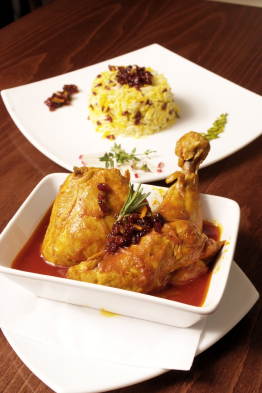 Is it like “Indian”?
Is it like “Indian”?
Persian cuisine has many shared culinary traditions with the great sub-continent, as you’d expect after millennia of interplay between neighbouring cultures, but is in fact radically different in virtually every important respect.
The emphasis is on delicate flavours and differing but complementary taste sensations, in which the carminative powers of herbs and spices are used to superb effect.
Ingredients such as nuts and fruits play a major part in many standard Persian dishes in a way completely alien to Indian dining culture, but on the other hand the thinking behind sophisticated grill marinades is broadly comparable. The best way to answer the question, perhaps, is that while devotees of Indian cuisine will assuredly be wowed by Persian fare the whole experience is fundamentally different.
It’s also fair to suggest that Persian cuisine is so diverse that its core elements will appeal to literally everybody, in one degree or another.
Is it healthy?
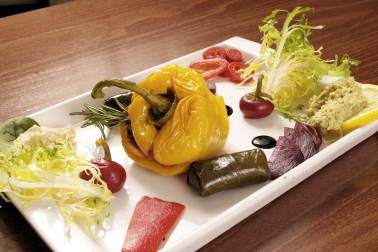 There’s always the option of rounding off a perfect meal with some of the most wicked desserts ever devised – the expression “to die for” could have been coined for Persian sweet pastries, ice creams and the rest – but in fact we’re being offered what may lay fair claim to being the healthiest cuisine in the world.
There’s always the option of rounding off a perfect meal with some of the most wicked desserts ever devised – the expression “to die for” could have been coined for Persian sweet pastries, ice creams and the rest – but in fact we’re being offered what may lay fair claim to being the healthiest cuisine in the world.
If that sounds like it might be dull, think again, because once you’ve savoured the glories of magnificent barbecued salmon or a zesty dish of chicken stew in walnut and pomegranate sauce you may wonder just why adventurous Glasgow has been denied this beautiful, fascinating food for so long.
You don’t have to be interested in home cooking or foreign culinary styles to enjoy the cuisine at Persia, but if you’re even remotely engaged by the wide and wonderful world of cookery techniques and ingredients you’re in for a major adventure.
Even the briefest of conversations with the owners, Farhad Ghomashchian and Hamid Dadrass, reveals great depths of insight into the nature of food and how it can best be enjoyed, not just “because it tastes nice” but because – in Persian terms – it’s a totally vital element of everyday life to be cherished and celebrated.
We’ve already touched on the tangential but important connections with the subcontinent, and it’s interesting to learn that Basmati rice – imported from the foothills of the Himalayas – is the preferred variety for Persian cookery, as it must have been for many centuries.
Meat consists, as elsewhere in the Islamic world, of fish, chicken and – hugely important – lamb; but they are purely the mainstays of a cuisine which creates taste sensations out of the broadest possible repertoire of ingredients, with pungent or tangy sauces and peppery finishes a constant theme.
Vegetarians are royally catered for, in a cuisine which excels in super-imaginative combinations of flavour, yet by contrast the sumptuous meat dishes are likewise in a class of their own.
Hearty stews and healthy salads; warming soups and crisply-finished barbecues – desserts made in heaven – are just some of the treats in store at Persia.
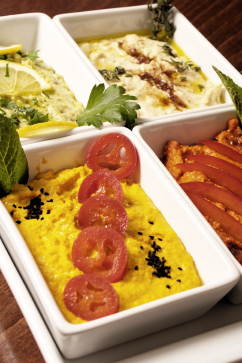 Preparation
Preparation
Farhad speaks feelingly of the effort it takes to simply get a real Persian kitchen functioning properly. The dish which appears on your table – visually delightful, wonderfully presented – is the result of endless hours of laborious yet inspired preparation.
He is a huge admirer of Persian cookery writer Najmieh Batmanlij, whose awesome literary chef d’ouvre, “Food of Life”, is a wonderful advertisement for everything the cuisine has to offer.
This lady’s massive and colourful book has ancestral recipes interspersed with insights, poetry, folklore and art which together evoke the full glory of what Persian dining culture is all about, from the sumptuous feasts prepared for weddings to the simple dishes which make even ordinary meals in an Iranian home more than a little special.
Presentation
The correct sourcing of exactly the right ingredients and a ruthless insistence on perfection at every stage of the cooking process sets the scene for dishes which look absolutely, shatteringly magnificent.
This is not the result of a casual flourish here, or a spot of garnish there, but rather of a creative discipline in which the final result often resembles nothing to much as some spectacular Safavid mural – it’s life imitating art. Nor is the effect purely decorative, because enshrined within the presentation is an intricately-wrought pattern of tastes and textures designed to engage the diner with a comprehensive feast of the senses: the “unforgettable meal” is always the supreme objective.
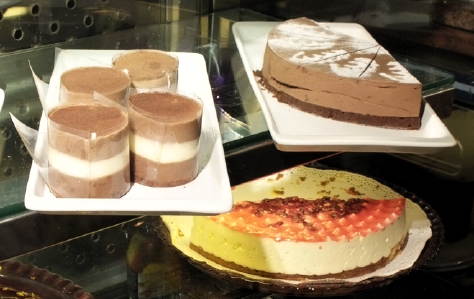 Why Glasgow?
Why Glasgow?
There have been Middle Eastern ventures in Glasgow before, although the city scene – so far as “Asia” is concerned – is massively dominated by frequently excellent Indian restaurants.
This is simply due to our very long colonial and then post-colonial association with the sub-continent, and in particular the Punjab. We’re fortunate to have a substantial Asian-Scots population determined to bring the best of their culinary heritage to city dining tables.
Nevertheless it has taken decades for Indian cuisine to “mature” to its current exemplary standard in Glasgow, and the sort of fare now available in our best restaurants simply wasn’t on offer in the formative days of the 70’s.
With Persian cuisine it’s a little different. It’s “new” to Glasgow – despite belonging to a truly ancient global culture – because it has evolved quite separately to Britain’s national experience: we know more about Chinese cuisine than Persian, for example, simply because of Hong Kong and all of the cultural benefits we derived, inadvertently, from that.
But of course it’s another story in the English capital. There is no shortage of Middle Eastern restaurants in London because there’s a large immigrant and second-generation community of people from Iran and many other countries who naturally want to enjoy their traditional cuisine.
And that, really, is precisely why the partnership behind Glasgow’s Persia restaurant wanted to come here – to fill a distinct gap in the market, bringing to a city renowned for its enthusiasm for exotic dining fare something genuinely “special”.
Twenty years ago there were no Hispanic restaurants in Glasgow until the late West End entrepreneur Allan Mawn, of fond memory, launched Barcelona in Byres Road (now Number 16 restaurant).
Go back a bit farther and there were no Italian restaurants either, yet now Italian dining culture is part and parcel of what Glasgow is surely all about. The people behind Persia are on a similar mission, and have arrived with a real conviction and determination about the way they want to present their fabulous cuisine to Glaswegians.
Farhad, self-evidently a master of his craft, says: “It would be relatively easy to open an ‘ordinary’ Persian restaurant in Glasgow, which people would probably enjoy well enough – but we were conscious from the outset that we were trying to bring something ‘new’ to the city, and that it had to be the best.
“There simply isn’t any room for compromises. You’ve got this vast, ancient cuisine – one that’s nevertheless highly dynamic and constantly evolving – and you’ve got the challenge of somehow extracting from that the essential elements in a way that does some justice to the culture.”
Much of the real work behind the cuisine at Persia isn’t readily visible to the casual diner trying the restaurant for the first time, because of course no restaurant on earth could present such a potentially vast repertoire in its entirety within a single menu.
Instead the restaurant provides an imaginative and all-embracing representation of the very best its owners’ heritage can provide.
Farhad comes from a family background where, as is often the case with Persian society, cooking is an all-consuming domestic passion. If there’s a single way of explaining the excellence which underpins the cuisine at Persia it’s perhaps “an infinite capacity for taking pains” – never taking a short-cut; always taking things to the n’th degree as a matter of habit and custom.
The team at Persia exude passion about everything they do. From the unfussy but polished table service – sit back and enjoy the magic moment when the main dish arrives on the table - it’s a place where diners immediately feel simultaneously at their ease but with the feeling, fully justified, that they’re about to enjoy something marvellous.
And maybe that’s the key to the whole experience – it’s simply never ordinary. You could visit Persia very regularly and never become tired of its seemingly neverending nuances.
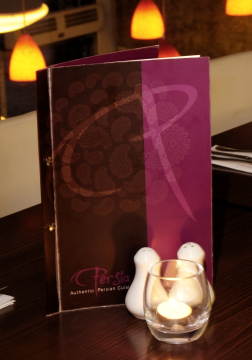 What about the critics?
What about the critics?
It’s a simple fact that Persia already attracts “foodies” from all over Scotland. It has the sort of polish, verve and panache you expect to find among the expensive and much-vaunted attractions of Edinburgh, and is – hideous but apposite cliché – an Aladdin’s cave of delights for anyone with a serious interest in advanced cookery.
There’s also the fact that there is simply no close equivalent to what Persia is doing anywhere in Scotland, and for that matter it might not be easy to find a restaurant offering anything quite so ambitious even in London, where despite the profusion of Middle Eastern restaurants many of the most-frequented outlets are perfectly fine, perhaps, but a little workaday – possibly because its Iranian patrons are seeking familiar standard dishes without being too worried about craft and presentation.
The best review the restaurant has attracted thus far is from Scotland’s top critic and food writer, Joanna Blythman, who – to some unfortunate restaurateurs’ chagrin – can be relied upon to leave what she regards as mediocre establishments in smouldering ruins, figuratively speaking, if she isn’t happy. Persia, fortunately, was treated to the bouquet rather than the brickbat.
Her review in The Sunday Herald leaves us in no doubt that she thinks Persia is, to put it bluntly, the bee’s knees.
Of course no matter how ecstatic any one person’s review may be it’s just that – one person’s opinion; but it’s certainly reassuring to find that the top critic regards what amounts to a pioneering Glasgow venture as being among the very best, particularly with regard to a culinary milieu where she’s evidently extremely knowledgeable.
But with the rave review comes a minor risk. Persia is, very simply, for anybody and everybody who likes great food at fair prices in delightful surroundings.
It isn’t a temple of gastronomy where earnest gourmands fuss over minor details and carry out forensic analysis of the various dishes – which is just as well, as when Gordon Ramsay tried that approach just up the road at what’s now Hotel du Vin it was a catastrophic failure: that style of service isn’t, in a nutshell, what most good dining in Glasgow is all about.
In the context of a Persian restaurant it would be doubly inappropriate, because it would also miss the main point about Persian-style dining – it’s the ambience, the sense that you’re engaged in a friendly, stylish, exciting dining experience that makes it so enjoyable.
Paradoxically, though, the sheer beauty of the dishes’ presentation puts the most pretentious “nouvelle cuisine” nonsense to shame.
And in a country where so many restaurants still appear obsessed with over-rich Franco-cookery, with heavy meats and sauces swimming in cream, Persian cuisine is at once subtle, enticing, visually delightful and ultimately totally satisfying.
It isn’t simply for people who “take food seriously”, let alone the strange sub-sect of professional food reviewers, some of whom don’t always know their aioli from their artichokes.
Iran (and no doubt neighbouring countries) has a culture of street food stalls which tend to centre on exotic and imaginative ways of presenting perfectly ordinary ingredients in enticing ways, and the everyday connection between people and “real food” is perhaps understood at this basic level – but more particularly in the home kitchen.
Elevate that to the concept of the professional restaurant seeking to make a statement about the glories of a premier league world cuisine, by extension, and you have to accept that sheer professional pride is going to play a major role in proceedings.
The history bit
That estimable Persian cookery book contains illustrations not only of the cuisine – incredible images – but also of panels, friezes and bas-reliefs charting the evolution of Persian cookery down through the ages. There are people bearing pomegranates at the court of Darius I, anecdotes of a culinary nature from the court of the illustrious Sassanian emperor Khusrau the Great; a banqueting scene from the much later Safavid dynasty, and so on – the art is a continual reminder that Persian cookery (and the whole sophisticated dining culture which goes with it) was already a truly great world cuisine at the time when the ancient Romans were a primitive tribe living in a wooden stockade.
Our modern concepts of “exotic Persia” are coloured, perhaps unfortunately, by poor adaptations of the Thousand and One Nights, or – ultimate pantomime – Aladdin.
Delve a little farther, into the real life culture inspired by the Sufi mystics, or the timeless poetry of Omar Khayyam, and the vast panoply of ancestral Persian culture is simply mesmerising in its shimmering brilliance. Glasgow’s Persia restaurant isn’t bedecked with a riot of images hearkening to this illustrious past but does have – strategically placed – just enough decorative flourishes to provide the discerning diner with some discreet visual prompts.
The owners are rightly proud of the magnificent tradition their venture represents, but it’s all managed with a lightness and sureness of touch that delivers the “less is more” message every time: it’s not just a great restaurant, it’s a nice place to be.
Fully licensed, with a wine offer specifically chosen to complement the dishes, Persia is a sophisticated but relaxing milieu in which haunting Persian music and, in the evening, flickering candlelight, draws the diner away from the dreich west of Scotland towards a timeless vista of romance and beauty. Try Persian ice cream with saffron and rosewater for dessert, perhaps ...
 The menu
The menu
There’s much more on Persia, and of course its menus, on the restaurant’s own website, which with very little fuss nevertheless manages to encapsulate all of the things which make this truly exciting arrival on the Glasgow dining scene worth an early visit.
Persia, 665 Great Western Road, Glasgow G12 8RE
email.
Telephone: 0141 237 4471







